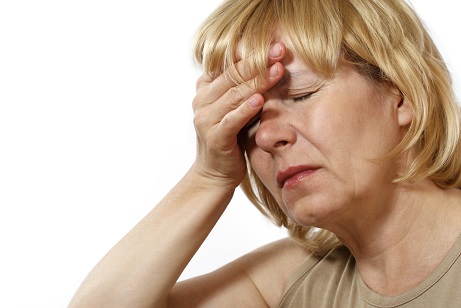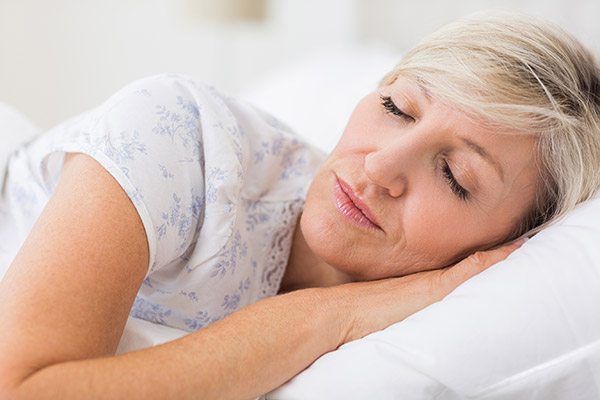After you have your last menstrual cycle, you enter a phase called menopause. You will experience significant physical changes in your body right before and during menopause. While most women experience menopause when they are between 48 and 55 years of age, perimenopause can occur 4-5 years before the onset of menopause. You may still have irregular periods during perimenopause but you will begin experiencing other menopausal symptoms such as cold feet, night sweats, and hot flashes. Many people also complain about experiencing depression. Is there any connection between menopause and depression? Can women do something to manage depression after they stop having their periods?
Can Menopause Cause Depression?
Probably yes. During this time, your body undergoes rapid hormonal changes, which may also affect the activity of neurons in the brain. You may also find yourself under stress due to changing body image, infertility, sexuality, or aging and these factors together can lead to mood swings and even depression.
During perimenopause, it is common and quite normal to experience minor mood swings, hot flashes, and insomnia. Things may become serious in some women and turn into a severe mood disorder called major depression. You are more likely to develop major depression if you have a history of depression or you have experienced depression after childbirth. You may also develop depression if you have had problems with mood around your regular menstrual periods.
What Symptoms Will Women Have?
 Now that you know that there is in fact a link between menopause and depression, you may be wondering what symptoms most women experience during this phase. Depression is a mental disorder, but the symptoms you experience can be emotional, physical, and behavioral. You need to have at least five of the following symptoms for at least two weeks to be diagnosed for depression. Moreover, one of the symptoms needs to be persistent feeling of sadness.
Now that you know that there is in fact a link between menopause and depression, you may be wondering what symptoms most women experience during this phase. Depression is a mental disorder, but the symptoms you experience can be emotional, physical, and behavioral. You need to have at least five of the following symptoms for at least two weeks to be diagnosed for depression. Moreover, one of the symptoms needs to be persistent feeling of sadness.
|
Physical Symptoms |
Emotional Symptoms |
Behavioral Symptoms |
|
Fatigue |
Suicidal thoughts |
Difficulty concentrating |
|
Overeating |
Restlessness |
Loss of interest in hobbies |
|
Decreased energy |
Irritability |
Difficulty making decisions |
|
Insomnia |
Feelings of pessimism |
Difficulty remembering details |
|
Excessive sleeping |
|
Neglecting responsibilities |
|
Persistent aches |
|
|
|
Early-morning wakefulness |
|
|
If you are experiencing any of these symptoms, you need to see your doctor immediately. It is important to work with your doctors to identify the best treatment option for you.
Treatments to Deal with Depression
When you experience menopause and depression, you need to consult with your doctor to find an appropriate treatment option. Here is what they might suggest:
1. Psychotherapy
Psychotherapy may prove effective in the treatment of depression related to menopause. Both interpersonal therapy and cognitive-behavioral therapy may help. Cognitive-behavioral therapy helps identify and change the pessimistic thoughts associated with depression, whereas interpersonal therapy focuses on understanding how a change in human relationships may lead to or relieve depression. It may take a couple of months though to see any positive results from psychotherapy.
2. Medication
 Your doctor may prescribe antidepressant medication to treat severe symptoms of depression. They may give you medication and in combination with hormone replacement therapy. The combination of hormone replacement therapy and antidepressants works well even for women with no depression symptoms in the past. While it takes time to see any effects, most women eventually notice a degree of improvement without any serious side effects.
Your doctor may prescribe antidepressant medication to treat severe symptoms of depression. They may give you medication and in combination with hormone replacement therapy. The combination of hormone replacement therapy and antidepressants works well even for women with no depression symptoms in the past. While it takes time to see any effects, most women eventually notice a degree of improvement without any serious side effects.
3. Develop a Good Support System
It is quite common for women to deal with more responsibilities in midlife – they have to take care of their own children and care for their elderly relatives as well. Together with menopause, these factors can contribute to depression. It is important to have a good support system in place. Do not push yourself to do it all alone; instead ask for help with meals, housekeeping, and other daily tasks.
4.  Stay Active
Stay Active
To overcome the effects of menopause and depression, you need to include some physical activity in your life. Spending 30 minutes in moderate exercise can improve your physical as well as mental health. In fact, you may see some positive effects by exercising only 10 minutes a day. Even a brisk walk for 10 minutes will do.
5. Manage Stress
Stress can aggravate your depression symptoms, so you need to do something to manage the most common stressors in your midlife, which could include caring for an elderly parent, children leaving home, marital changes, occupational problems, and the death of a loved one. Some women place high expectations on them and find them in stress when they fail to achieve those goals. Set realistic expectations, stay active, and try meditation or other relaxation techniques to keep stress under control.
6.  Sleep Well
Sleep Well
Depression can make it difficult to fall asleep, but you have to do whatever you can to get enough good quality sleep. It promotes good physical and mental health at all stages of life. Talk to your doctor and learn about establishing good sleep habits to manage stress and depression.
7. Mind Your Diet
What you eat will also have an impact on how you feel physically and mentally. Your diet can make menopause and depression symptoms worse or better, depending on your choices. Here are some tips to help you eat in a healthy way:

- Include food in your diet that contains B vitamins, including B12, B6, and folic acid. Take a multivitamin supplement to increase your intake of these vitamins or eat leafy greens to get folic acid.
- Eat food rich in omega-3s. Found in fish, such as salmon, tuna, and sardines, omega3s help fight depression and relieve its symptoms. You can take fish oil supplements to get omega-3s.
- Drink plenty of water, men should drink no less than 96oz/day and women should aim for 64oz/day. This helps keep your body hydrated and improves digestion. This will also maintain healthy body temperature and help with depression.
- Avoid or limit intake of caffeinated beverages because they can stimulate your nerves first and then lead to a drop in energy. These beverages can also change your mood suddenly.
- Do not drink alcohol because it can make your symptoms worse.
- Avoid processed sugars and refined carbs because they are highly addictive and make you consume more to keep your energy level up. Instead, eat complex carbs such as veggies, fruits, and healthy grains such as cereals, breads, and pasta made from whole grains.
- Eat food rich in iron, calcium, selenium, magnesium, and zinc to prevent or alleviate the severity of your depression symptoms.
